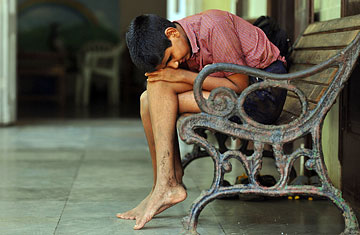
A visually impaired child rests during the celebrations at the Victoria School for the Blind in Mumbai on September 1, 2010
The morning of February 12 Rouvanjit Rawla, a 14-year-old boy from Kolkata, burst out of the shower to show his mother his first sprouts of armpit hair. A fun-loving teenager who listened to Beethoven, loved soccer and enjoyed his mother's pasta carbonara, Rawla was by all accounts a normal kid. But that evening after his classes, Rawla, the boy who had been so excited about growing up that morning, hanged himself. Rawla's parents placed the blame for his suicide squarely on his school and their practice of corporal punishment. Despite an almost decade long federal ban on the disciplinary tool, Rawla's headmaster had caned the boy for skipping class only four days earlier.
On Monday, Rawla's headmaster along with three teachers from his school were arrested, making it the first major step in a corporal punishment case in India in years. The four school officials have been charged with assaulting a child and abetting the suicide of a minor. While the teachers don't deny they disciplined Rawla, they say there's no link between their use of corporal punishment and his suicide. Rawla's caning, however, is not an isolated event, say experts, and his death brought renewed focus on the strict punishments facing kids at schools across India. Says Shantha Sinha, chairperson of the National Commission for Protection of Child Rights (NCPCR), "There are human rights violations in every school in India.
Rawla attended the elite, 175-year-old La Martiniere for Boys, one the top schools in India known for its outstanding academic and extracurricular performance. It's not just La Martiniere's high ceilings and grand façade that follow in the tradition of Britain's elite schools, the school uses caning as means of punishment. Though British schools officially banned caning in the 1980s, it is still common practice in some traditional schools in India. The state of West Bengal went as far to explicitly ban caning in 2004. Officials at La Martiniere declined to comment to TIME. Though the headmaster denies caning had anything to do with Rawla's suicide, he has admitted publicly to the "judicious use" of the cane, but only to express his pain "that a child's behavior caused."
After finding his son's journal, Ajay Rawla filed a report with the police against the headmaster and three teachers. The teenager's private diary documented in heart-breaking detail the hardships he faced at school. "Do not take me to school. There is too much pulling and tugging, it hurts," he wrote. Ajay Rawla says teachers continuously victimized his son. "He was slapped for whistling in class once. When the fact was that he couldn't whistle," Ajay Rawla told TIME. The father says he had earlier withdrawn Rouvanjit's older brother after teachers had hit him as well. "If only I had taken Rouvanjit off too at that time, he would be alive today," he says.
Another death last year brought public attention to the practice, but that time it was a crowded government school. Eleven-year-old Shanno Khan, born in a New Delhi slum, was forced by her teachers to stand in the sun for hours as punishment for being unable to recite the alphabet correctly. She slipped into a coma and later died in the hospital. A 2007 report by the UNICEF and Save the Children claims 65 percent of children in India face some kind of corporal punishment at school, and according to one of Delhi's top child psychologists, Dr. Dherandra Kumar, this sort of discipline can hinder a child's development. Hitting children as punishment, Dr. Kumar says, can "lead to various neurotic disorders like depression, low self esteem," adding that "schools should focus on positive ways of disciplining like through counseling."
Though NCPCR records show a 40% drop in corporal punishment complaints from 2008 to 2010, the reduction does not indicate abuse has stopped. With nearly half of all Indians accepting corporal punishment as a necessary tool for disciplining children, according to a 2007 government study, the vast majority of cases are not reported. Plan India, a New Delhi based advocacy group, has been teaching schools across the country about more positive disciplinary techniques like rewarding good behavior, but they say they face an entrenched culture of physical punishment. Lilly Vishwanathan, program manager for Plan India says, "The basic argument seems to be that we have been through it and we have survived despite it so it's not that big a deal."
With the tragic deaths of Khan and Rawla, India's government has made reforms to curb the practice. Following Rawla's death in February, India's Women and Child Development Ministry issued fresh guidelines on school discipline. Any violation of the ban is now punishable by a three-year prison term and a fine of $1000. The ministry also agreed with the NCPCR's recommendation to set up sealed collection boxes in schools where children can lodge their complaints. A representative body comprising of school management authorities, teachers, students, alumni and child rights experts will review these complaints monthly and report abuses to the proper authorities. Though there's never been a major conviction for corporal punishment, just bringing the school officials to court creates an important precedent. Says Sinha from the NCPR, "Every teacher will now think twice before hitting or abusing a child."
